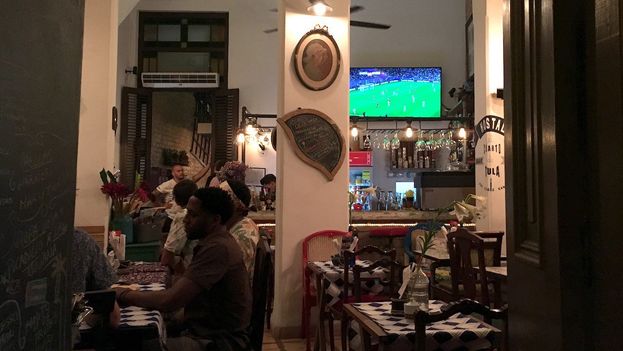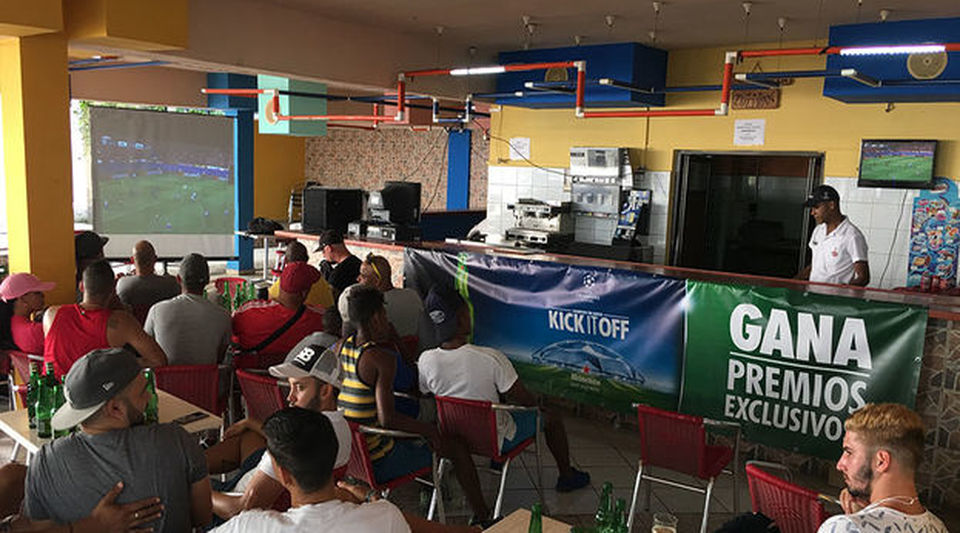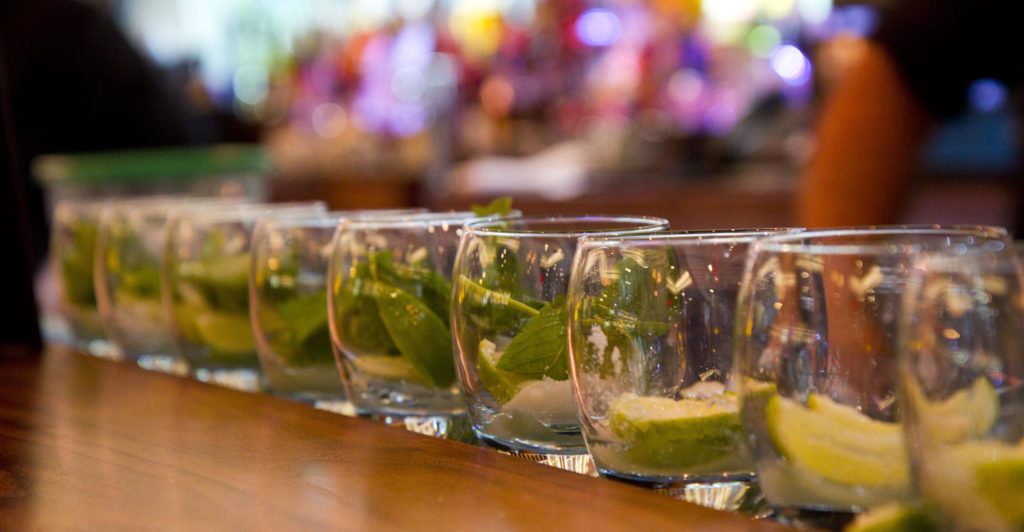 CUBANS VERY EXCITED BY THE WORLD CUP OF FUTBOL AND THE BETTINGS.
CUBANS VERY EXCITED BY THE WORLD CUP OF FUTBOL AND THE BETTINGS.
Cuba lives to the rhythm of the World Cup. ‘Paladares’ (Small Private Businesses), coffee shops and clandestine bookies make their august during the international tournament.
“The business was bad and then the World Cup began,” says Osmel Chapman, a waiter at a private restaurant near the corner of Infanta and San Lazaro in Havana. Like many palates and coffee shops, in the premises they take advantage of a large television screen where they broadcast all the meetings.
Although baseball maintains its status as a national sport, soccer is winning the game among the youngest. The reasons are many, from the attraction that generates the games of international championships that are broadcast on national television, through the excessive politicization of the ball to reach the least resources needed football to play.
“The result has been that we are full since we open at noon until we close at midnight because people like to watch football in company”
“We have prepared a special offer for these days: three beers, a drink and a pica pica well stocked for 10 CUC.”, Promotes Chapman. “The result has been that we’re full since we open at noon until we close at midnight because people like to watch football in company.”
 Many private businesses have created special offers for customers that fill these days your premises. (14ymedio)
Many private businesses have created special offers for customers that fill these days your premises. (14ymedio)
The sports channel of the official television, Tele Rebelde, transmits each game live and since the Telstar 18 [official and smart ball of this tournament] starts to roll, the premises where there is a TV are replenished. The phenomenon does not happen only in the bars managed by self-employed, but it reaches the hotels, the state coffee shops and even the reception of some offices in which a television has been installed.
“When we raise the most money in the hours that matches are broadcast with popular teams among Cubans, for example, Latin American soccer players have a lot of fans who support them here,” explains Chapman. “Argentina, Uruguay, Mexico and Costa Rica have filled the place, also Spain and Portugal are very dear”.
Niury Fonseca, who sends snacks and tapas in a nearby private business with three 52-inch screens dedicated to the World Cup, matches. “Here people jump, scream, cry and get excited as if they were in Moscow, watching the games live.”
“This reminds me of those years when the first Brazilian telenovelas arrived in Cuba and at the time they started everything was paralyzed,” says Juan Guillermo Pérez, 48, a football coach for children under 12 years old. “Now when it goes out on the street it’s easy to see if they’re playing a good game or not, because it’s deserted.”
While he is speaking, a shout goes down Neptuno Street in Centro Habana for some ball that has gone to the inside of the goal and fans chant the cry of “Gooool”. Minutes later, children play with a patched ball and stage a duel between France and Peru, which the Europeans have finally won.
For 90 minutes life seems to stop. But not all moments are of joy. This Tuesday, tears welled up in the eyes of several spectators who enjoyed the game between Croatia and Argentina at the Vedado Hotel, where the Australes fell by 3 to zero. “They embraced as if they had died a relative,” the barman ironic.
Throughout the city beat world airs and fans bring color with their outfits, particular cries and even dances to accompany their favorite teams. Argentina’s Argentine jerseys, the reds of the Spanish national team and the yellow-green colors of Brazil are the most repeated; and on the black market, sales of stockings, sneakers, pulovers and other fetishes related to this sport have skyrocketed
The images of the imposing Luzhniki stadium, with a capacity for 81,300 spectators, make everyone shriek with joy.
THE BETS RUN IN A VERTIGINEOUS AND ABUNDANT FORM.
Bets, despite being illegal, are common. Sometimes in a more overlapping way, others in an obvious way, football fans risk hundreds and even thousands of pesos in each game. Watches, cell phones, rings, bracelets and gold chains go hand in hand as the goals come.
“You bet on everything, from which team you will win until how many goals will be made or which players will be the ones to do them”
Carlos, a fictitious name, reveals details of his work as “prompter and bank” of football betting in a state-owned coffee shop in the Nuevo Vedado area. “You bet on everything, from which team you will win until how many goals will be made or what players will be the ones who will do them”, he explains to this newspaper. “The amounts vary, but we have a minimum of 10 CUC, so we do not get a lot of people with cents.”
This Wednesday, with the match between Uruguay and Saudi Arabia, Carlos pocketed 230 CUC “clean without almost sweating,” he says. “I picked up a lot of bets in favor of Uruguay, which finally won, but also the people put enough money that they were going to be more than two goals in their favor, I preferred to bet because they were going to win with only one,” he says.
At the end of the game, Carlos distributed the money discreetly among the winning clients. “The employees of the cafeteria know what we are doing but they also want to sell because they always leave with a good tip and because these days they bring many products from their homes to sell them too”.
“The most important thing here is that people enjoy, spend but do not faje, because if there is a fight we all lose: the employees, us and the bets,” he says.
“We have multiplied by three the consumption of beer in the last week, before we sold about 100 cans a day, between customers who came to the bar and those who sat at the tables, but now is rare the day we go down 300”
The problem is not only the fights and the prohibited bets, but also the supplies. “We have multiplied by three the consumption of beer in the last week, before we sold about 100 cans a day, between customers who came to the bar and those who sat at the tables, but now it is rare the day we go down 300,” says Chapman while cleaning the restaurant tables.
The stores and state markets suffer a serious shortage of drinks. “There is no beer,” one employee reiterates to each client who arrives at the Carlos III Plaza, the most important shopping center in the city. “There are people who roam around this place very early to buy several boxes as soon as they see the beer truck arrive.”
The woman attributes the high demand to consumption in private cafeterias and bars for the sports tournament. “The owners of palates want to guarantee that their customers have enough beer during the meetings and that they take a lot to earn more, in some places the beer is at 2 CUC and, despite that high price, it ends”, he reflects.
“And this is nothing, there are still more than three weeks until this madness ends, I do not know how we are going to put up with it.”
SPONSORS
 EXPLOTA EN CUBA LA FIEBRE POR EL MUNDIAL DE FÚTBOL Y LAS APUESTAS.
EXPLOTA EN CUBA LA FIEBRE POR EL MUNDIAL DE FÚTBOL Y LAS APUESTAS.
Cuba vive al ritmo del Mundial de Fútbol. ‘Paladares'(Pequeños Negocios Privados), cafeterías y corredores de apuestas clandestinos hacen su agosto durante el torneo internacional.
“El negocio iba mal y entonces empezó el Mundial de Fútbol”, cuenta con una gran sonrisa Osmel Chapman, camarero de un restaurante privado próximo a la esquina de Infanta y San Lázaro en La Habana. Como muchas paladares y cafeterías, en el local le sacan partido a una gran pantalla de televisión donde transmiten todos los encuentros.
Aunque el béisbol mantiene su estatus de deporte nacional, el fútbol le está ganando la partida entre los más jóvenes. Las razones son múltiples, desde la atracción que generan los juegos de campeonatos internacionales que se transmiten en la televisión nacional, pasando por la excesiva politización de la pelota hasta llegar a los menos recursos que necesita el balompié para jugarse.
“El resultado ha sido que estamos llenos desde que abrimos al mediodía hasta que cerramos a medianoche porque a la gente le gusta ver el fútbol en compañía”
“Hemos preparado una oferta especial para estos días. Tres cervezas, un trago y un pica pica bien surtido por 10 CUC.”, promociona Chapman. “El resultado ha sido que estamos llenos desde que abrimos al mediodía hasta que cerramos a medianoche porque a la gente le gusta ver el fútbol en compañía”.

Muchos negocios privados han creado ofertas especiales para los clientes que llenan estos días sus locales. (14ymedio)
El canal deportivo de la televisión oficial, Tele Rebelde, transmite en vivo cada juego y desde que la Telstar 18 [balón oficial e inteligente de este torneo] empieza a rodar, los locales donde hay un televisor se repletan. El fenómeno no ocurre solo en los bares gestionados por cuentapropistas, sino que alcanza a los hoteles, las cafeterías estatales y hasta la recepción de algunas oficinas en las que se ha instalado un televisor.
“Cuando más recaudamos es en las horas en que se transmiten partidos con equipos populares entre los cubanos, por ejemplo los futbolistas latinoamericanos tienen mucha fanaticada que los apoya aquí”, detalla Chapman. “Argentina, Uruguay, México y Costa Rica han llenado el lugar, también España y Portugal son muy queridos”.
Niury Fonseca, que despacha bocaditos y tapas en un cercano negocio privado con tres pantallas de 52 pulgadas dedicadas al Mundial, coincide. “Aquí la gente salta, grita, llora y se emociona como si estuvieran en Moscú, mirando los juegos en vivo”.
“A mi esto me recuerda aquellos años que llegaron a Cuba las primeras telenovelas brasileñas y a la hora que empezaban todo se paralizaba”, cuenta a 14ymedio Juan Guillermo Pérez, de 48 años y entrenador de fútbol para niños menores de 12 años. “Ahora cuando se sale a la calle es fácil darse cuenta si están poniendo un buen juego o no, porque se queda desierta”.
Mientras habla, una gritería recorre la calle Neptuno en Centro Habana por alguna pelota que ha ido a parar al interior de la portería y los seguidores corean el grito de “Gooool”. Minutos después unos niños pasan jugando con un balón remendado y escenifican un duelo entre la selección de Francia y Perú, que finalmente han ganado los europeos.
Durante 90 minutos la vida parece detenerse. Pero no todos los momentos son de alegría. Este martes, las lágrimas brotaron de los ojos de varios espectadores que en el hotel Vedado disfrutaban del juego entre Croacia y Argentina, en el que los australes cayeron por 3 a cero. “Se abrazaban como si se les hubiera muerto un pariente”, ironiza el barman del lugar.
Por toda la ciudad baten aires de mundial y los hinchas aportan colorido con sus atuendos, gritos particulares y hasta bailes para acompañar a sus equipos preferidos. Las camisetas albicelestes argentinas, las rojas de la selección española y los colores verde amarillos de Brasil son los más repetidos; y en el mercado negro se ha disparado la ventas de medias, zapatillas, pulovers y otros fetiches relacionados con este deporte
Las imágenes del imponente estadio Luzhniki, con capacidad para 81.300 espectadores, hacen chillar de júbilo.
LAS APUESTAS CORREN EN FORMA VERTIGINOSA Y ABUNDANTE.
Las apuestas, a pesar de ser ilegales, son comunes. A veces de manera más solapada, otras de forma evidente, los fanáticos del fútbol arriesgan cientos y hasta miles de pesos en cada partido. Relojes, celulares, anillos, pulseras y cadenas de oro pasan de mano en la misma medida que llegan los goles.
“Se apuesta por todo, desde cuál equipo va a ganar hasta cuántos goles se harán o qué jugadores serán los que los hagan”
Carlos, nombre ficticio, desvela detalles de su labor como “apuntador y banco” de apuesta del fútbol en una cafetería estatal de la zona de Nuevo Vedado. “Se apuesta por todo, desde cuál equipo va a ganar hasta cuántos goles se harán o qué jugadores serán los que los hagan”, explica a este diario. “Las cantidades varían, pero tenemos un mínimo de 10 CUC, para que no se nos meta mucha gente con centavos”.
Este miércoles, con el partido entre Uruguay y Arabia Saudí, Carlos se embolsó 230 CUC “limpios sin casi sudar”, asegura. “Recogí muchas apuestas a favor de Uruguay, que finalmente ganó, pero también la gente puso dinero bastante a que iban a ser más de dos goles a favor de ellos. Yo preferí apostar porque iban a ganar con solo uno”, cuenta.
Al final del partido, Carlos distribuyó el dinero discretamente entre los clientes ganadores. “Los empleados de la cafetería saben lo que estamos haciendo pero también quieren vender porque siempre se van con buena propina y porque por estos días ellos traen muchos productos de sus casas para venderlos también”.
“Lo más importante aquí es que la gente disfrute, gaste pero no se faje, porque si hay bronca todos salimos perdiendo: los empleados, nosotros y las apuestas”, cuenta.
“Hemos multiplicado por tres el consumo de cerveza en la última semana, antes vendíamos unas 100 latas diarias, entre clientes que llegaban al bar y los que se sentaban en las mesas, pero ahora es raro el día que bajamos de 300”
El problema no son solo las peleas y las apuestas prohibidas, sino también los suministros. “Hemos multiplicado por tres el consumo de cerveza en la última semana, antes vendíamos unas 100 latas diarias, entre clientes que llegaban al bar y los que se sentaban en las mesas, pero ahora es raro el día que bajamos de 300”, cuenta Chapman mientras limpia las mesas del restaurante.
Las tiendas y mercados estatales sufren una grave carestía de bebidas. “No hay cerveza” reitera una empleada a cada cliente que llega a la Plaza de Carlos III, el centro comercial más importante de la ciudad. “Hay gente que ronda por este lugar desde muy temprano para comprar varias cajas en cuanto ven llegar el camión de cerveza”.
La mujer achaca la alta demanda al consumo en cafeterías y bares privados por el torneo deportivo. “Los dueños de paladares quieren garantizar que sus clientes tengan cerveza suficiente durante los encuentros y que tomen mucho para ganar más. En algunos lugares la cerveza está a 2 CUC y, a pesar de ese precio alto, se acaba”, reflexiona.
“Y esto no es nada, todavía faltan más de tres semanas para que esta locura termine, no sé cómo vamos a aguantar”.
Agencies/14ymedio/Zunilda Mata, La Habana/Internet Photos / Arnoldo Varona/ TheCubanHistory,com
THE CUBAN HISTORY, HOLLYWOOD.








